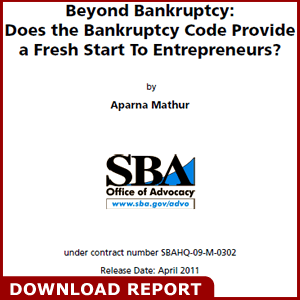Small businesses that have previously filed for bankruptcy are no more burdened than other small firms by poor cash flow, high health insurance costs, or excessive taxes, and they attain similar firm sizes, according to a study released today by the U.S. Small Business Administration’s Office of Advocacy. However, they have about a 24 percent higher likelihood of being denied a loan and are charged interest rates at least 1 percent higher than other firms. The report finds that firms owned by African and Latino Americans are even more likely to be denied loans and charged higher interest rates.
“Small businesses filing for bankruptcy have an opportunity for a new start. This new start is hampered by the challenges of obtaining new loans. This can impede innovation and job creation,” said Chief Counsel for Advocacy Winslow Sargeant.
The study, Beyond Bankruptcy: Does the Bankruptcy Code Provide A Fresh Start to Entrepreneurs? by Aparna Mathur, finds that owners of 2.6 percent of firms have filed for bankruptcy at some point in the previous seven years. Credit rationing of previously bankrupt firms leads to a class of discouraged borrowers who are significantly less likely even to apply for a loan, according to the study.
The research relies on data from the National Survey of Small Business Finances as a basis for the analysis. Surveys were conducted by the Federal Reserve Board in 1993, 1998, and 2003. The full study is available online at www.sba.gov/advocacy.
The Office of Advocacy of the U.S. Small Business Administration (SBA) is an independent voice for small business within the federal government. The presidentially appointed Chief Counsel for Advocacy advances the views, concerns, and interests of small business before Congress, the White House, federal agencies, federal courts, and state policymakers. For more information, visit www.sba.gov/advo, or call (202) 205-6533.
Posted at 8:02 AM



